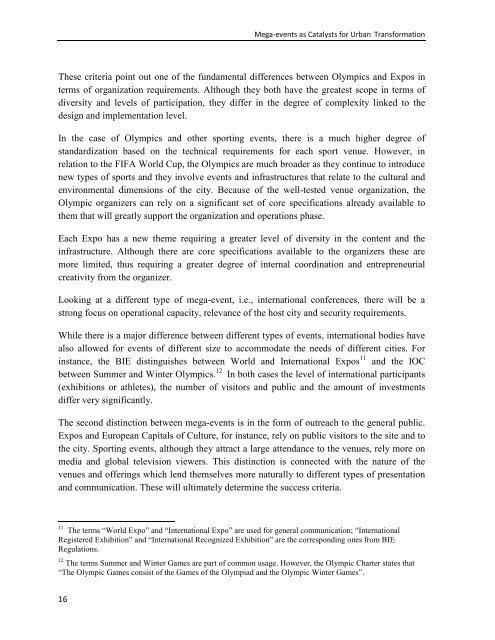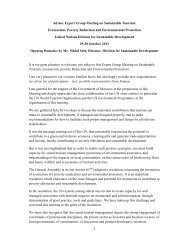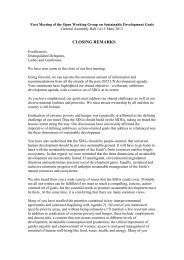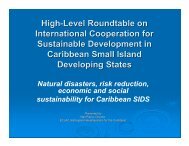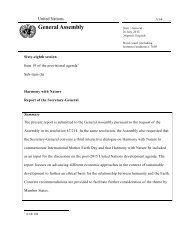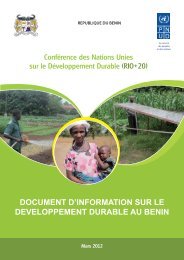A Guide for Sustainable Urban Development of the 21st Century
A Guide for Sustainable Urban Development of the 21st Century
A Guide for Sustainable Urban Development of the 21st Century
You also want an ePaper? Increase the reach of your titles
YUMPU automatically turns print PDFs into web optimized ePapers that Google loves.
Mega-events as Catalysts <strong>for</strong> <strong>Urban</strong> Trans<strong>for</strong>mationThese criteria point out one <strong>of</strong> <strong>the</strong> fundamental differences between Olympics and Expos interms <strong>of</strong> organization requirements. Although <strong>the</strong>y both have <strong>the</strong> greatest scope in terms <strong>of</strong>diversity and levels <strong>of</strong> participation, <strong>the</strong>y differ in <strong>the</strong> degree <strong>of</strong> complexity linked to <strong>the</strong>design and implementation level.In <strong>the</strong> case <strong>of</strong> Olympics and o<strong>the</strong>r sporting events, <strong>the</strong>re is a much higher degree <strong>of</strong>standardization based on <strong>the</strong> technical requirements <strong>for</strong> each sport venue. However, inrelation to <strong>the</strong> FIFA World Cup, <strong>the</strong> Olympics are much broader as <strong>the</strong>y continue to introducenew types <strong>of</strong> sports and <strong>the</strong>y involve events and infrastructures that relate to <strong>the</strong> cultural andenvironmental dimensions <strong>of</strong> <strong>the</strong> city. Because <strong>of</strong> <strong>the</strong> well-tested venue organization, <strong>the</strong>Olympic organizers can rely on a significant set <strong>of</strong> core specifications already available to<strong>the</strong>m that will greatly support <strong>the</strong> organization and operations phase.Each Expo has a new <strong>the</strong>me requiring a greater level <strong>of</strong> diversity in <strong>the</strong> content and <strong>the</strong>infrastructure. Although <strong>the</strong>re are core specifications available to <strong>the</strong> organizers <strong>the</strong>se aremore limited, thus requiring a greater degree <strong>of</strong> internal coordination and entrepreneurialcreativity from <strong>the</strong> organizer.Looking at a different type <strong>of</strong> mega-event, i.e., international conferences, <strong>the</strong>re will be astrong focus on operational capacity, relevance <strong>of</strong> <strong>the</strong> host city and security requirements.While <strong>the</strong>re is a major difference between different types <strong>of</strong> events, international bodies havealso allowed <strong>for</strong> events <strong>of</strong> different size to accommodate <strong>the</strong> needs <strong>of</strong> different cities. Forinstance, <strong>the</strong> BIE distinguishes between World and International Expos 11 and <strong>the</strong> IOCbetween Summer and Winter Olympics. 12 In both cases <strong>the</strong> level <strong>of</strong> international participants(exhibitions or athletes), <strong>the</strong> number <strong>of</strong> visitors and public and <strong>the</strong> amount <strong>of</strong> investmentsdiffer very significantly.The second distinction between mega-events is in <strong>the</strong> <strong>for</strong>m <strong>of</strong> outreach to <strong>the</strong> general public.Expos and European Capitals <strong>of</strong> Culture, <strong>for</strong> instance, rely on public visitors to <strong>the</strong> site and to<strong>the</strong> city. Sporting events, although <strong>the</strong>y attract a large attendance to <strong>the</strong> venues, rely more onmedia and global television viewers. This distinction is connected with <strong>the</strong> nature <strong>of</strong> <strong>the</strong>venues and <strong>of</strong>ferings which lend <strong>the</strong>mselves more naturally to different types <strong>of</strong> presentationand communication. These will ultimately determine <strong>the</strong> success criteria.11 The terms “World Expo” and “International Expo” are used <strong>for</strong> general communication; “InternationalRegistered Exhibition” and “International Recognized Exhibition” are <strong>the</strong> corresponding ones from BIERegulations.12 The terms Summer and Winter Games are part <strong>of</strong> common usage. However, <strong>the</strong> Olympic Charter states that“The Olympic Games consist <strong>of</strong> <strong>the</strong> Games <strong>of</strong> <strong>the</strong> Olympiad and <strong>the</strong> Olympic Winter Games”.16


